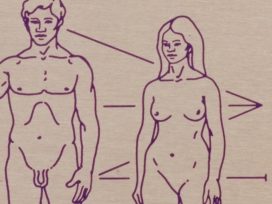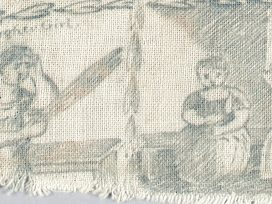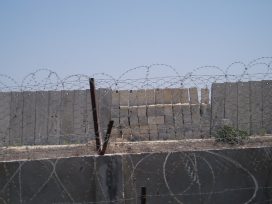In 2014, the Polish documentary ‘Solidarity According to Women’ attempted to reinstate the key role that several women played in the rise and success of the 1980s Solidarity movement.
Largely working behind the scenes, they left the visible leadership roles to the men who wanted them, and so were written out of history. Today, women are making history again in defence of Polish democracy, but this time they are the leaders we see – and they will not be forgotten this time.
On 15 July this year, an urgent communiqué from the Polish Women’s Strike warned in clear terms: ‘Poland is burning down!’ The rallying cry called on all opposition parties and pro-democracy forces to unite against the ruling Law and Justice (PiS) party’s attempt to take control of the judiciary announced in a rush a few days before.
This latest anti-democratic move by an increasingly authoritarian government would see the destruction of the principle of tripartite division of power between the legislative, executive and judicial branches that underpin a functioning Polish democracy. PiS had already taken apart the Constitutional Tribunal in a crisis that paralysed the country last autumn. Now it sought to dismantle the independence of the judiciary.
Frustrated at the opposition’s fragmentation, civil society groups’ inability to collaborate, and lack of a united plan between them to block PiS, the Polish Women’s Strike took it upon themselves to organize an emergency coalition meeting on 16 July – to seek cooperation between groups on a strategy for resistance at least for the immediate future while on red alert. Their communiqué stated: ‘When our home is on fire, we do not discuss who did and did not do what eight years ago. We do not remember sins, we do not compete for beautiful words and looks, we do not beat our breasts in front of the camera, we do not go on holiday. We save what we can.’
After an intensely urgent meeting, a memorandum of agreement was signed between many allies to agree to create a pro-democratic coalition, at least for the upcoming days. Since then, large-scale mass protests have swept the country. Cooperation has been shaky at times, but largely intact. ‘We are not naive – we don’t think we’ve created a long-term reality, this political collaboration is for here and now – we don’t know how it will develop next,’ – says 49-year-old Elżbieta Podleśna, a leading PWS activist and professional psychologist.
How and why did women, under the banner of Polish Women’s Strike, become a key mobilizing force and convening power in the struggle to defend democracy in a country where women have low political visibility and feminism is a bad word? I spent two nights at the tent village they, together with other civil society groups, erected outside Parliament in Warsaw, and spoke with key members of PWS to learn there was a longer history at play.
Black protests
On 3 October 2016, in the dripping rain, 100,000 women from 149 different towns and cities in Poland took to the streets, dressed in black, in what became known worldwide as the ‘Black Protest’ or ‘Polish Women’s Strike’ against a proposed total ban on abortion. Many more women as well as men wore black to work in an act of solidarity.

Black March in support of abortion rights, Łódź, October 2016. Photo: Zorro2212. Source: Wikimedia Commons
Marta Lempart, who is now PWS’s formidable leader, was the main impetus behind this action, taking inspiration from Iceland’s 1975 women’s strike for equal pay. This was a lightning-rod moment – a point at which many women stepped out onto the street to protest for the first time to say enough is enough. As one 73-year-old protesting woman told me ‘PiS has now got into bed with us! No more!’ The result of the Black Protest was a retreat by PiS on the abortion law – at least for the moment.
While PiS was not the first government to strip away women’s rights, it has ramped up the attacks. In 1993, abortion law was restricted for the first time since the 1950s, putting Poland amongst the most conservative on this issue in Europe. This near-total restrictive law was known as the ‘compromise’ – ‘it had nothing to do with women’, says Elżbieta Podleśna, ‘and everything to do with a compromise between the Catholic church and the state’. As Kasia Narkowicz wrote for openDemocracy wrote last year people slowly came to accept this status quo, and only a small circle of feminists continued to battle a growing anti-women tide.
Journalist Joanna Solska writes in a recent Institute of IDEI report on women’s rights, that in the last eight years, under the former government, headed by Civic Platform, ‘the cauldron wasn’t hot yet’. Women were discriminated against on the job market, had lower pay, and family policy aided their tie to the household, but, still, most women were taking it. ‘But after eight years in cooler water, now the frogs are starting to cook. And it’s the PiS government which is heating things up with increasing fervour. The church is supplying fuel too.’
On 8 March 2017, International Women’s Day, the newly founded group ‘Polish Women’s Strike’ organised a second protest – this time international in scope. ‘We surprised the whole world!’, says Marta Puczyńska, a 26-year-old PWS activist who has just thrown in her whole ‘former life’, as she calls it, having quit her job in Poznań to move to Warsaw to be full-time at the picket-fence. ‘It was a historical moment – protests in 60 countries worldwide – a phenomenon!’
Direct action
In July, the government upped the ante by accelerating its attempts to tear apart the country’s democratic structures, motivated by a paranoid, conspiracy-theory led vision in which such institutions needed purging of communist relics. The sense of impending bodily threat spurs these women on yet further. ‘We, women, in particular are in great danger. Our right to safety and self-determination at the biological level is being undermined. We fight for life,’ the Polish Women’s Strike wrote in their call to collaborate.
Around 75% of those sleeping at the protest tent village, keeping 24-hour watch over the goings-on in parliament opposite, are female. ‘More women sleep here in the tents at night, even beneath the open sky, than men because we have greater determination’, Marta Puczyńska tells me. ‘Not only are we threatened right now by the ruling government’s dismantling of the tripartite division of power as citizens, but our rights as women have never before been so threatened – so we have twice the determination of men, because some things don’t affect them directly. This threat for us is so much more personal.’
Alicja Molenda, who at 51 lives and organizes in Berlin for PWS, notes that ‘Women have everything to lose – in women an awareness has awoken that if I don’t fight for my own rights, then nobody will – neither politicians, men – nobody. Without democracy we will have no rights for women – and without women’s rights there is no democracy! So we are here because we must be.’
The success of the Women’s Strike also meant that PWS was catapulted into a leadership role at this critical time. ‘The one protest that had an effect was the Women’s Strike – so we are seen as people who can make things happen. We don’t just talk, we do,’ Agnieszka Wierzbicka, a lawyer who actively supports PWS’s work, says. PWS have played a big part in mobilizing citizens, organizing actions, being vocal in the media, leading protests, and keeping a presence day in, day out in the tent village opposite parliament.
There is a sense that women offer a different kind of approach to protest and ways of working too – one that is more ‘effective’, Marta Lempart has said, and based on collaboration. Not all in PWS are sure whether this is innately to do with being a woman, or just because they are who they are as people.
With events moving fast, and Polish Women’s Strike being less than a year old, interpreting and understanding womanhood is still emerging, both individually and collectively. What feminism means to them is not a one-trick answer. Where there is at times a seeming impossibility of moving away from stereotypes, they are made use of, or drawn upon, as inspiration instead.
Agnieszka Wierzbicka recalls a moment of insight when she was proofreading the Polish Women’s Strike’s call for collaboration. The metaphor of the house burning down immediately reminded her of a poem by Władysław Broniewski called ‘Bayonets for Weapons’ which is a call to take up arms for Poland and starts ‘When they come to burn the house down…’
‘The poem describes a male reaction to the burning down of one’s house – to go to war. PiS have set our house on fire and we are reacting like women – coming together. Those people in our house are family. These are not the relations of those mythical concepts of fatherland – which are also important – but of the home, and this speaks closely to people.”
Sitting by the barricades, Elżbieta Podleśna tells me ‘I think women are capable of speaking in a different language – a language of nonviolence,’ and Polish Women’s Strike attempts to embody that. At the moment when parliament passed the proposed bill that politicizes the judiciary, women from PWS and supporters lay on the asphalt in the road outside parliament, holding hands in silent protest to mark the point in time ‘when democracy died’. A white rose – which has become a symbol of ’extreme hate’, according to Jarosław Kaczyński (PiS party Chair) and PiS – one of hope and anti-fascist resistance for the opposition – lay on each of their bodies.
Fighting talk
This struggle over language has become central. At the meeting convened by Polish Women’s Strike it was on the agenda. ‘We must change the language we are using to talk about one another – no talking about protestors causing “scenes”, no talking about “jumping over the barriers”. We are in this together.’
This discipline comes largely as a response to the toxic media environment in which public television has become a PiS propaganda machine. News headlines have included ‘Paedophiles and child-support-payees are the face of protestors’. Increasingly hate-filled, aggressive and crude attacks have emanated from forums ranging from parliament to the internet.
A part of Polish Women’s Strike’s vision is to contribute to changing this, to stem the tide of hate that many feel has reached never-before-seen proportions between opposing sides. Most recently, Kaczyński shouted at the opposition during a session in parliament, saying that they are ’criminals’ who ’murdered his brother’ (who died in the Smoleńsk air crash in 2010, which PiS believes was a Russian plot) and yelled at an opposition MP to ’shut his gob!’.
This has brought on a backlash from moderates. ‘He has offended all of us Poles’, cry three women who’ve travelled to Warsaw to protest the reforms. ‘We are here for that reason – we will not allow PiS to make a circus out of our parliament!’ Defending civility and ’parliamentary’ – which in Polish means polite – engagement is increasingly part of what many women see themselves as doing, and the linguistic links with democratic functioning in those concepts is not a coincidence. With PiS enabling and encouraging hate-fuelled fascist groups like Mlodiez Wszechpolska (All-Polish Youth) and ONR (National Radical Camp), the stakes could not be higher.
Elżbieta Podleśna, whose own family has a traumatic wartime history and who lives in Warsaw, is very worried by what she is seeing. Recently she attended a counter-demonstration against fascist groups, and reflected in detail on her experience there.
‘I cannot understand a situation in which a country in which concentration camps functioned, in which a huge proportion of society disappeared, in which our neighbours disappeared, can allow itself to have people marching with fascist symbols through its main streets in the capital city, who with their fists in the air call out for the death of enemies of the fatherland, for the death of anyone! I went up to those people and asked them: who are these enemies of the fatherland? Are you talking about me? And I heard – yes, we mean you, said directly into my eyes.’
In response, Elżbieta has taken to a vision inspired by Wiktor Ośiatynski, a Polish constituional lawyer and human rights advocate, who died recently. ‘He said that our main obligation as people is “the dissemination of kindness”. Only in this way can we oppose fascism, obscurantism, defend the courts,’ says Elżbieta. ‘We are trying to do this, but it’s very difficult, because in the current masculinist understanding that has prevailed for many years in government and its structures, the kindness of women means the submission of women. So it is very hard to understand that the kindness of women is a strength and not a sign of weakness.’
‘I came to civil disobedience slowly – but I saw what an amazing power there was in the use of non-violence. How, when we sit down together and hold each other’s hands, there is so much energy. Once I read somewhere that love is a giant bomb, and that exactly spoke to me, that this kind of dignity and peace is indeed the biggest bomb. If you look at Kaczyński and those guys – his rage is greater when he is confronted by people who do not show rage. But it is very hard, very difficult not to show rage.’
One of the most devastating effects socially of the political rift and its toxic language has been at the interpersonal level. ‘PiS has killed my family,’ writes one woman in chalk on the pavement outside Parliament – ‘For two years I have had no contact with my Mum and Dad. They love PiS – I don’t!’
Increasing suspicion and mistrust between people in daily life is another fatality. ‘I saw a man with a dog walking across the street from us as we put up our posters here at the tent village. Long ago I would have been afraid of his dog perhaps – but now I look at the man, and I look at his eyes and how he is looking at me. I really want to cry when I say this, because these are things that we will have to rise up from for many years to come. Perhaps the whole of Europe will have to. Fear is easy to create, easy to sow. I am thinking that kindness should also be that easy to sow. But kindness is not media-friendly – it is not sellable. Would somebody write about the fact, for example, that a 92-year old woman came to me, Mrs. Józefa, bringing us soup and asking us to do everything we can to make sure Poland doesn’t leave the European Union?’
Elżbieta’s voice breaks at this moment as she holds back tears after an exhausting and emotional few days. ‘Does this interest anybody? No! And we have lost in this way. Because for the first time in my life I feel the values I believed in may have stopped meaning anything – and on such a big scale that it seems we don’t have anyone to turn to – Mum! Dad! Europe! America!’
Umbrella groups
Often in return even for polite disobedience, women face harassment, bullying, repression and discrimination in their communities. This is especially true in smaller towns, where the ability to be an anonymous face in a crowd is limited. Hate on the internet is merely an everyday occurrence.
Beata Siemaszko, a key member of PWS, based in a small town north-east of Warsaw, addressed the Polish Women’s Strike emergency meeting to give her perspective. ‘For participating in these actions we get called names in the street, our children are bullied at school.’ Jola Jackiewicz, an active member of PWS and Silesian Pearls, based in Rybnik, a town of 140,000 people in Upper Silesia, mother and grandmother, shares the story of a female teacher who is regularly harassed by her pupils over the internet for her pro-women, pro-refugee views. She would like to organise actions to support disabled children, but is afraid, due to growing fascist sentiment. She worries about the repercussions for her children, but attends protests anyway.
Concerns are not unfounded: two female teachers in Zabrze, Upper Silesia, were dismissed from their work at a local school for wearing black on the day of the Polish Women’s Strike. There are reports of police intimidating participants and handing out fines for legal acts of protest. The church also acts as a custodian of ultra-conservative, pro-government sentiment. Alicja confirms that ‘representatives of some churches don’t want to give the sacrament to the children of those who participate in strikes.’
Across the border, where Alicja lives in Berlin, the Polish Catholic Church organized a counter ‘White Protest’, putting up photographs of the Black Protestors on their website, denouncing them as women who promote the murder of children. For participating in the current demonstrations there are also fears of recrimination – it means being the face of the opposition – those ‘of the worst sort’, as Kaczyński has labelled protestors, those ‘communists’, ‘animals’, ‘pigs’ and ‘thieves’. With this in mind, PWS has also set up a citizens’ legal aid alliance called ’Little Umbrellas’. The name was inspired by the symbolism of the umbrellas women carried on that rainy day in October last year.
During the second week of protests against the politicisation of the judiciary underway, people gathered not only in Warsaw, but also across country in nightly candlelit vigils outside local courts. President Duda’s double veto does not deter the crowds, especially since he has just signed the third bill which protestors were also seeking a veto for.
More and more people are coming out onto the streets. Young people are joining the throng of the older generation who remember life without freedoms. Those in smaller towns are finding they are not perhaps as alone as they thought, and this unity is one of the main positives in a toxic situation. Through organizing and participating in new relationships, alliances and bonds have been formed.
Marta Puczyńska sees hope in that ‘we are also becoming educated through what is happening not only as women but as citizens in this young democracy – we are learning that we can go out onto the streets, we have a right to protest, to speak out.’
Agnieszka Wierzbicka feels that ‘awareness of our strength as women is just awakening. This is a moment that has pushed women to the frontline and will be remembered in history. But we can’t go back and retreat, we can’t take up that subordinate role again that we have had for centuries. We must stay at the frontline – and we will learn how to do that.’
This article first appeared in openDemocracy on 25 July 2017.







